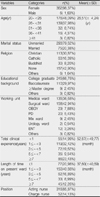Abstract
Purpose
The purpose of this study was to identify the effects of nursing competency of nurses on job satisfaction and nursing performance.
Method
Using a structured questionnaire, data were collected from 368 nurses. Descriptive statistics, t-test, ANOVA, Scheffé test and pearson correlation coefficient with SAS package were used for data analysis.
Results
The total mean score for nursing competency was 2.65, with scores for subcategories as follows: ethical competency 2.74, personal competency 2.65, esthetical competency 2.64, and scientific competency 2.61. The mean score of total job satisfaction was 3.18 on a 5 point scale, and nursing performance was 2.97 on a 4 point scale. Total nursing competency and total subcategories of nursing competency perceived by nurses were positively related to job satisfaction and nursing performance.
Figures and Tables
References
1. Benner P. From novice to expert: Exellence and power in clinical nursing practice. 1984. Menlo Park, CA: Addison-Wesley.
2. Campbell B, Mackay G. Continuing competence: An Ontario nursing regulatory program that supports nurses and employers. Nurs Adm Q. 2001. 25(2):22–30.

4. Chang YH, Cho YS, Kwak MJ. A study of factors related nursing competency in nurses. Clin Nurs Res. 2006. 12(1):7–19.
5. Cho KH. The influence of self-leadership about job-satisfaction and outcome of nursing practice. 2003. Seoul: Korea University;Unpublished master's thesis.
6. Choi J. The character of the nursing organizational culture and organizational effectiveness. 2003. Seoul: Korea University;Unpublished doctoral dissertation.
7. Jang KS. A study on establishment of clinical career development model of nurses. 2000. Seoul: Yonsei University;Unpublished doctoral dissertation.
8. Kim HY. A development of nursing competency for operating room nurses using a clinical ladder system. 2005. Kwanju: Chonnam National University;Unpublished master's thesis.
9. Kim SJ. A comparison of affecting variables on nursing competency between nursing home nurses and hospital nurses. 2009. Daegu: Catholic University of Daegu;Unpublished master's thesis.
10. Ko YK, Lee TW, Lim JY. Development of a performance measurement scale for hospital nurses. J Korean Acad Nurs. 2007. 37(3):286–294.

11. Lee JR. A study on the effects of strengthening distribution workers' core competence on their organizational performance. 2009. Busan: Dong-A University;Unpublished master's thesis.
12. Lee MJ. A study of factors related to clinical competency in nurses. 2002. Seoul: Yonsei University;Unpublished master's thesis.
13. Locke EA. Gruneberg M, Wall T, editors. "Job satisfaction". Social Psychology and Organizational Behavior. 1984. New York: John Wiley & Sons.
14. Milkovich GT, Newman JM. Compensation. 2002. 7th ed. New York: McGraw-Hill.
15. Queen VA. Performance evaluation: Building blocks for credentialing and career advancement. Nurs Manage. 1995. 26(9):52–55.
16. Seo SS, Lee JH. A study on the impact of core competence of E-commerce business models on business performance. J KECRA. 2008. 9(3):17–32.
17. Shin YK. Organizational Behavior Theory. 1985. Seoul: Dasan Books.
18. Spencer LM, Spencer SM. Competency at work: Models for superior performance. 1993. New York: John Wiley & Sons.
19. Stamps PC, Piedmont EB, Slavitt DB, Hasse AM. Measurement of work satisfaction among health professionals. Med Care. 1978. 16(4):337–352.

20. Sung YH, Jeong JH. Defining the core competencies of the nursing in a tertiary hospital and comparing different units based on their respective characteristics. J Korean Acad Nurs Adm. 2006. 12(1):76–93.
21. Yoon SH. A model for organizational effectiveness in nursing unit. 2000. Seoul: Korea University;Unpublished doctoral dissertation.




 PDF
PDF ePub
ePub Citation
Citation Print
Print






 XML Download
XML Download